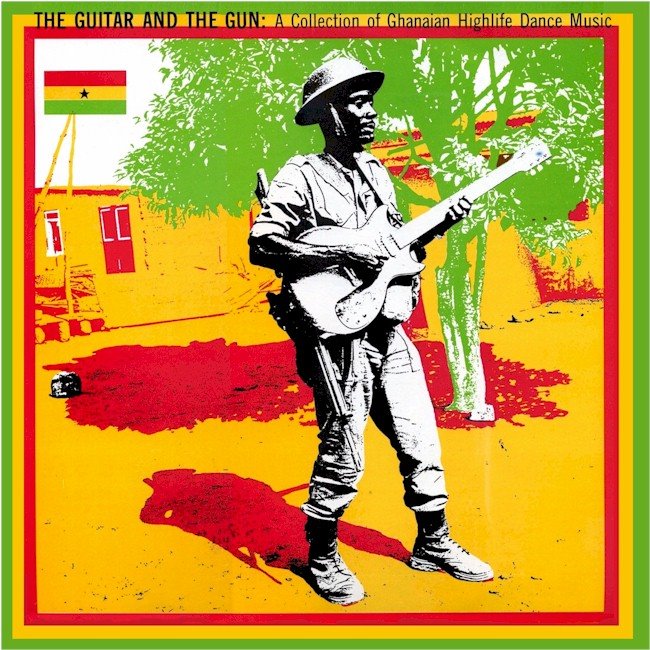Last month I gave you A.B. Crentsil's great 1985 LP Toronto by Night, with a promise of more sophisticated sounds from the king of '80s Ghana highlife. Well, here they are! Tantie Alaba (Earthworks/Rough Trade ERT 1004, 1984) was recorded at the Ghana Film Studios in Accra, and has more of an "organic" sound than Toronto.
Researching this series of posts devoted to Ghana music from the '80s, I've been digging through my archives, compiled back in the days before the internet, and came across issue #5 of Africa Beat magazine, published in London in Summer of 1986. It contains a most informative article, "Sweet Talking Man," about Mr. Crentsil, then on a European tour:
The dramatic plunge in the value of the Ghanaian currency, the cedi, has thrown up some stories. One of the most heartbreaking is the virtual death of the Ghanaian recording industry. The price of imported basics, like guitar strings or vinyl, has killed off virtually every full-time touring professional band. Some put the number of survivors as low as three.
One man who has survived all this and a lot more is A.B. Crentsil, the 36-year-old singer whose mid-1970s band Sweet Talks was a germinating ground for some of the strongest talents to emerge out of Ghana during the last ten years - the Sunsum Band, Eric Agyemang and Thomas Frempong among them. But the figures even he throws out so casually are terrifying. He starts off talking about how his second band the Lantics were stolen away from the Atlantic Hotel by an extra 25 cedi a month - "100 cedi a month was a lot and we were happy to go!," he chuckles. Now he talks about paying his bus driver 10,000 cedi a day, a week, a month, whatever it takes to keep him.
Even more scaring is his account of the break-up of Sweet Talks in 1979 and the court battle to get money out of the manager of the Talk of the Town Hotel who owned the band's instruments and in a lot of ways seemed to own their souls as well. "In court we heard that Phonogram had paid him 5.4 million cedis. Out of that we had seen 68,000 cedis." Needless to say there were dark doings in the background and A.B. is not a rich man - but her survives.
And away from the numbers, back to the music. Throughout the 1970s A.B. played in the best hotel bands in Ghana - first the El Dorados, performing funk, reggae and James Brown material, the usual songs known as "copyright." The there was the Lantics, again tied to a top hotel but this time getting away to record the first album, Adam & Eve [as the Sweet Talks] in 1975. They had been spotted playing in the hotel by Phonogram MD Arthur Tay who swept them off to the 16-track EMI studio in Lagos which was quite a jump from the two-track they had used for three 45s earlier.
The 75-venue tour of Ghana which followed built Sweet Talks into one of the biggest bands in the land. Throughout the string of LPs that followed - Kusum Beat, Spiritual Ohaia, Osode - it was all up and up, closer to dangerous temptations that lay in wait when Phonogram Holland took them to Los Angeles' Total Experience studio to record the best-selling Party Time [Hollywood Highlife Party]. It was then that they discovered that their manager was using their money to send a Thunderbird back to Ghana. It was when they got back they discovered they were broke, and broke up....Which brings us up to 1984, and Tantie Alaba, recorded with Mr. Crentsil's reorganized Super Sweet Talks International, and the first of his albums to receive modest international distribution. Here's a nice video someone made of the title track, utilizing footage that apparently has nothing to do with the song itself, but, I'm sure you'll agree, matches up very well indeed!
A.B. Crentsil & Super Sweet Talks International - Tantie Alaba
A.B. Crentsil & Super Sweet Talks International - Akpêtêchi Seller
A.B. Crentsil & Super Sweet Talks International - Odo
A.B. Crentsil & Super Sweet Talks International - Who is Free
Download Tantie Alaba as a zipped file here.













